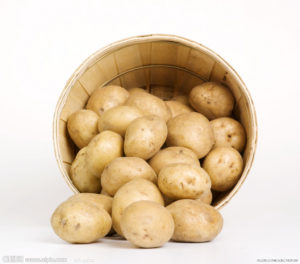
Potatoes are high in starch so they’ve developed a bit of a bad reputation due to the popularity of low-carb diets and fad Palaeolithic diet. But, carbohydrates aren’t bad for your health as long as you watch your portions. Potatoes can easily be part of a healthy diet and if you include the skins, they’re a good source of fiber and vitamin C.
One plain potato is a good source of both vitamin C and potassium and has less than 160 calories. Although potatoes are high in carbohydrates from starch, they’re low in sugar, fat, and sodium.
Potatoes are high in potassium, which works in opposition to sodium to help regulate blood pressure and fluid balance. It’s also essential for normal muscle and nerve function. Vitamin C is needed for normal immune system function, blood clotting and strong connective tissue and blood vessel walls.
Isn’t the starch in potatoes bad for me?
It’s true that potatoes are high in starch, which is where most of the calories come from. The thing with starch is that it’s a storage form of sugar and your body’s good at digesting it and absorbing it. If you only eat a plate full of potatoes with nothing else, you might see a substantial impact on your blood sugar levels. But, I mean, eating nothing but a big plate of potatoes for dinner seems weird.
You can combat that blood sugar rush by serving your potatoes as part of a balanced meal. Like maybe a piece of salmon with whipped potatoes and a side of green beans. The addition of protein from the salmon and fiber from the green beans slows down the digestion and absorption of the starch.
Aren’t potatoes high in calories?
No, not really. One medium plain potato has about 150 to 160 calories. The excess calories come from the beastly ways consumers torture the poor things, either by deep frying them (you know: French fries or potato chips) or burying them under globs of cheese or gravy.
If you’re watching your weight, you need to be careful about what you put on your potatoes. Better toppings include salsa, green veggies, or reduced fat sour cream.
You’ll find fresh potatoes in the produce section of the grocery store.
The most common types are white, yellow and red potatoes and you might find blue ones too. They’re all similar nutritionally, but they have slightly different textures so it’s important to choose potatoes based on how you are cooking them.
Choose potatoes that have a firm texture, with no cuts or discolorations. Store them in a cool, dry and dark place. You can refrigerate them but it changes the flavor a bit. Potatoes can be stored for a few weeks, but they may sprout. If that happens, just cut the sprouts out before cooking.
Most grocery stores carry premade mashed potatoes, hash browns, frozen potatoes and French fries that you heat in your oven. Look at food labels to check out the calorie counts when you shop for these items.
The main problem with potatoes is how unhealthy they can become when they’re fried, turned into chips, or slathered in heavy sauces, butter, or cheese. Compare the calorie counts for one serving of potatoes when they’re prepared in less healthy ways:
Potato Recipes
These recipes are all tasty, easy to make, and retain the healthy goodness of potatoes:
Source: verywellfit.com
| Baked Potato Nutrition Facts | |
|---|---|
| Serving Size 1 Medium Baked Potato with Peel | |
| Per Serving | % Daily Value* |
| Calories 159 | |
| Calories from Fat 2 | |
| Total Fat 0.22g | 0% |
| Saturated Fat 0.1g | 0% |
| Polyunsaturated Fat 0.1g | |
| Monounsaturated Fat 0g | |
| Cholesterol 0mg | 0% |
| Sodium 17mg | 1% |
| Potassium 919mg | 20% |
| Carbohydrates 36g | 28% |
| Dietary Fiber 4g | 15% |
| Sugars 2g | |
| Protein 4g | |
| Vitamin A 0% · Vitamin C 22% | |
| Calcium 3% · Iron 10% | |
| *Based on a 2,000 calorie diet | |